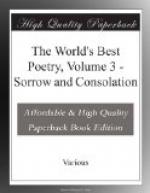Everywhere flourish the flower of the rose, and the
clustering vine
Pour out its branches around, wet with their glistering
sheen.
All for the sake of the wisdom and grace it was his
to combine;
Priest of the gay and profound, sweetest of singers
terrene.
From the Greek of SIMMIAS.
Translation of WILLIAM M. HAUDINGE.
INSCRIPTION ON MELROSE ABBEY.
The earth goes on the earth glittering in gold,
The earth goes to the earth sooner than it wold;
The earth builds on the earth castles and towers,
The earth says to the earth—All this is
ours.
ON THE TOMBS IN WESTMINSTER ABBEY.
Mortality, behold and fear
What a change of flesh is here!
Think how many royal bones
Sleep within these heaps of stones;
Here they lie, had realms and lands,
Who now want strength to stir their hands,
Where from their pulpits sealed with dust
They preach, “In greatness is no trust.”
Here’s an acre sown indeed
With the richest royallest seed
That the earth did e’er suck in
Since the first man died for sin:
Here the bones of birth have cried
“Though gods they were, as men they died!”
Here are sands, ignoble things,
Dropt from the ruined sides of kings:
Here’s a world of pomp and state
Buried in dust, once dead by fate.
FRANCIS BEAUMONT.
ELEGY WRITTEN IN A COUNTRY CHURCHYARD.
The curfew tolls the knell of parting day,
The lowing herd wind slowly o’er
the lea,
The ploughman homeward plods his weary way,
And leaves the world to darkness and to
me.
Now fades the glimmering landscape on the sight.
And all the air a solemn stillness holds,
Save where the beetle wheels his droning flight,
And drowsy tinklings lull the distant
folds:
Save that, from yonder ivy-mantled tower,
The moping owl does to the moon complain
Of such as, wandering near her secret bower,
Molest her ancient solitary reign.
[Hark! how the holy calm that breathes around
Bids every fierce tumultuous passion cease;
In still small accents whispering from the ground
The grateful earnest of eternal peace.][8]
Beneath those rugged elms, that yew-tree’s shade.
Where heaves the turf in many a moldering
heap,
Each in his narrow cell forever laid,
The rude forefathers of the hamlet sleep.
The breezy call of incense-breathing morn,
The swallow twittering from the straw-built
shed,
The cock’s shrill clarion, or the echoing horn,
No more shall rouse them from their lowly
bed.
For them no more the blazing hearth shall burn,
Or busy housewife ply her evening care;
No children run to lisp their sire’s return,
Or climb his knees the envied kiss to
share.




